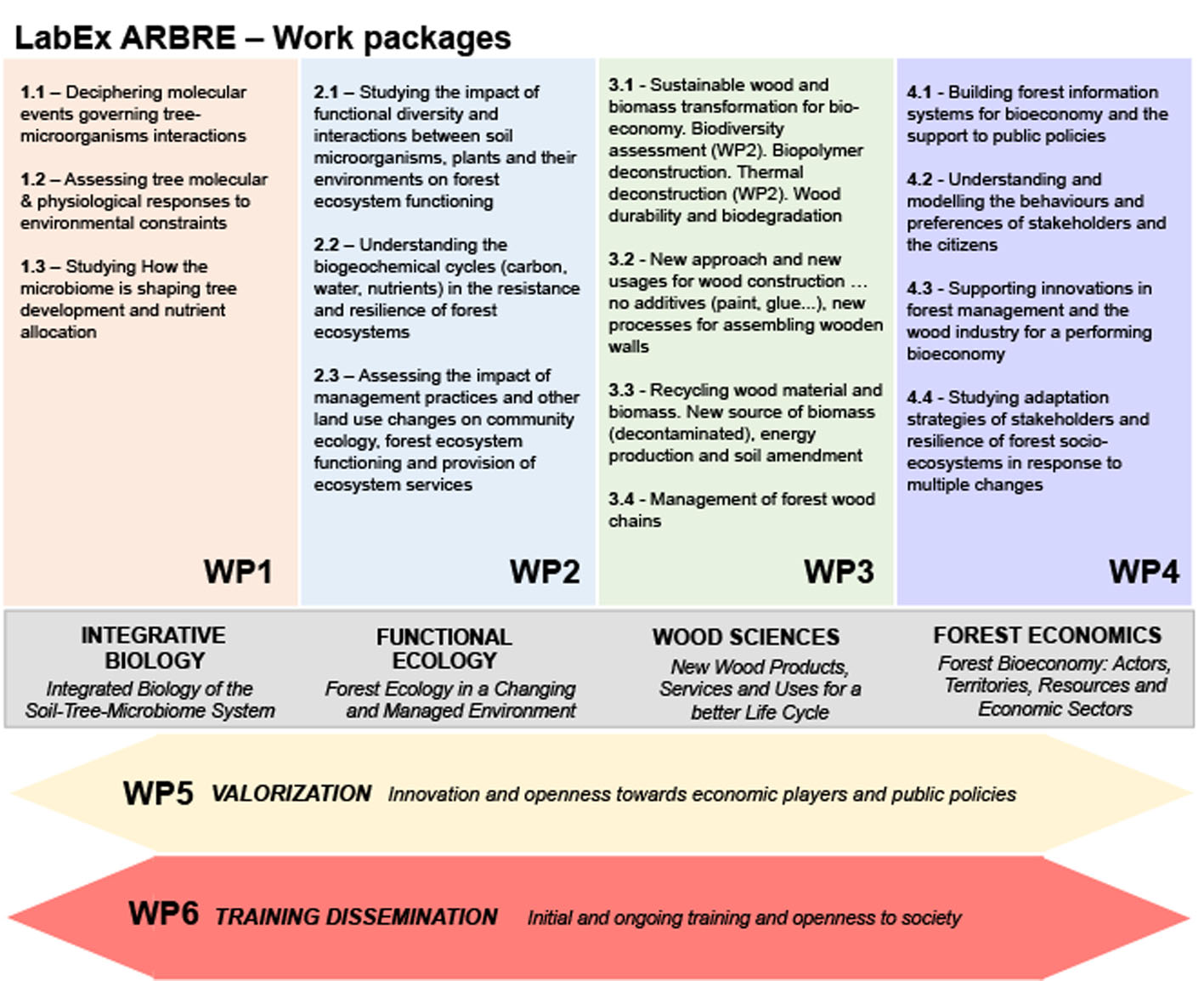Organizing our research
The executive board of ARBRE welcomed the idea of establishing working groups focused around four thematic areas and two transversal axes of the LabEx ( all presented as work packages (WP)) with the following objectives:
- To facilitate knowledge transfer between different research units by evaluating ongoing research by each thematic area (within research units involved with ARBRE), ultimately to make available current research results and developing methodology.
- To identify the needs and expectations of each proposal to then implement a proactive plan of action for each thematic area (for launching future multi-disciplinary projects, for sharing techniques and work sites, etc.). ARBRE will provide support funding for collaborative projects that promote the LabEx mission.
The group leaders for each thematic area or work project are:
– WP1 – Integrative biology: Sébastien DUPLESSIS / Nicolas ROUHIER
– WP2 – Functional ecology: Delphine DERRIEN /Matthias CUNTZ
– WP3 – Wood sciences: Christine GERARDIN / Mathieu PETRISSANS
– WP4 – Forest economics : Serge GARCIA
– WP5 – Valorization: Catherine COLLET / Caroline ROGAUME
– WP6 – Training-Dissemination: Pascale FREY-KLETT / Marie-Christine TROUY
They have been appointed initially for a period of 4 years; each development team will be permitted to evolve as needed. The role of these thematic area coordinators is to implement operational innovative strategies, to promote research exchange and to organize scientific and technical seminars. Several seminar exchanges will be planned each year per thematic area.
The development of each work package will be monitored with the help of LabEx (accompanied by the project manager and as needed, by the management committee).
WP1: Interactions tree microorganisms
Long-term Objectives. WP1 will integrate genomics know-how and toolkits to identify major gene, networks and molecules controlling soil-microorganisms-tree interactions as well as tree development and functioning. This will include (i) comparative genomics of model trees (poplars) and model forest soil micro-organisms, (ii) population and landscape genomics to identify genes involved in environmental adaptation, (iii) knowledge of the spatial and temporal expression of gene networks, and (iv) a better understanding of the mechanisms determining resilience of trees and microorganisms to abiotic and biotic stresses thanks to their associated microbes and to an improved understanding of their redox detoxication systems and responses to drought stress. The proposed project will determine which circuits affect the ability of trees and interacting microorganisms to adapt to an ever-changing, frequently challenging environment.
WP2: Forest Ecology in a Changing and Managed Environment
Long-term Objectives. Forest research is assailed by requests from stakeholders working on public policies or on forest management to come up with methods to produce more wood while preserving ecological potential and biodiversity of forest ecosystems. To cope with these seemingly contradictory requests, ARBRE, will concentrate its skills and competencies to understand: (i) the processess involved in ecosystem responses to a changing environment; (ii) the variability of these processes considering internal (soil properties, composition of microbial communities) and external factors (climate, water stress, forest management); (iii) the role of species diversity and its spatial variability in the resilience of forest ecosystems; and (iv) the conditions for up-scaling these processes from molecule to ecosystem, landscape and country.
WP3: New Wood Products, Services and Uses for a better Life Cycle
Long-Term Objectives: The WP3 will aim for: (i) better understanding of microbial wood decay machinery, (ii) improved control of the natural resistance of wood to microorganisms, as a key property for durability without chemical preservatives, (iii) new tailored innovative green products from the wood biomass and (iv) decision support tools for analyzing environmental and economic impacts of changes in forest-wood production chains. The added value of ARBRE will be to stimulate interdisciplinary research between wood scientists, biologists and economists, in order to promote interactions between wood and forest scientists, engineers and stakeholders, and enhance the competitiveness of the French forest sector, taking into account the diversity of forest production systems and hardwood species.
WP4: Actors, territories, resources and economic sectors of the forest in a bioeconomic perspective
The goal of the WP4 is to develop original approaches in economics and social sciences to ensure the sustainable provision of forest ecosystem services – ES – (wood, biomass energy and other ES) and the preservation of biodiversity, and to meet societal demand for new forest products and environmental protection. These two points constitute the necessary condition for a forest bioeconomy, facing the challenges of ecological transition, energy transition and changes in land use.
For a better understanding of stakeholder games for an innovative forest bioeconomy, the WP4 aims to: i) identify drivers of forest resource management, changes and trade-offs, and better understand the impact of public policies on the provision of forest ES and societal well-being, ii) study the behaviour of landowners in terms of production choices in relation to resource and environmental constraints, and society’s preferences for ES and forest products The originality of the WP4 is based on a dialogue between economics, industry, ecology and society. This WP aims to provide new modelling tools to the timber industry and strategies for effective adaptation of forest socio-ecosystems to multiple changes and shocks (climatic, health, trade, etc.).
WP5: Valorization and transfer of know-how to society and the forestry sector
The objectives of WP5 are to develop and support innovation and openness to stakeholders and public policies. The Labex ARBRE supports the creation of start-ups and transfer projects.
WP6: Training – Awareness of the scientific approach and Dissemination
The objectives of WP6 are to participate in the development of training within the University of Lorraine and to support the training of students, young researchers and professionals in the field of tree biology, forest ecology, wood science and forest bioeconomy. This WP has not only a transversal action within the Labex ARBRE, but has the will to be open to different issues affecting society and requiring a dialogue between citizens and scientists. Participatory research actions are thus developed linking science and industry (e.g. truffle) or science/society (e.g. Citique).



